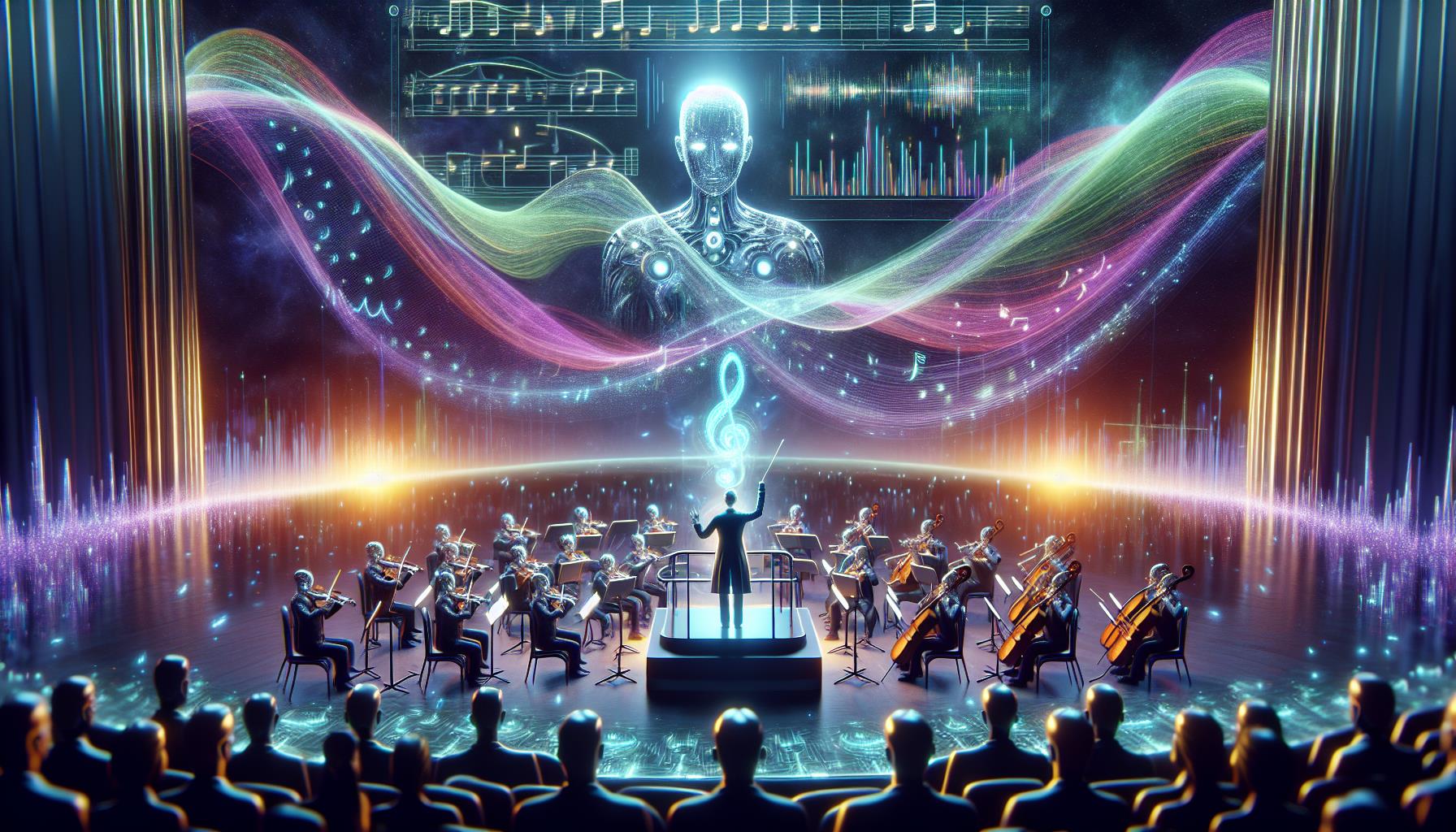A NEW REVOLUTION BY AGIMAGEAI! 🚀
Soon, Albert at AGImageAI will introduce a new feature tool named COMPOSER, designed to enhance the capabilities of our platform. As part of the initial showcase, we will present an early example: a mockup of Beethoven’s “Für Elise” created using the COMPOSER tool. This demonstration by AGImageAI aims to highlight the innovative applications and potential of the new feature in transforming classical compositions.
The story of “Für Elise,” one of Beethoven’s most beloved pieces, adds an intriguing layer to this presentation. Though the identity of Elise remains a mystery, the delicate and expressive melody has captivated audiences for generations. Its simple yet profound beauty makes it an ideal choice for demonstrating the COMPOSER’s capabilities, offering a glimpse into how our technology can breathe new life into timeless classics.
Prompt: Please provide a song similar to Fur Elise of Beethoven.
The relationship between artificial intelligence (AI) and music has historically been one of curiosity and groundbreaking exploration. AI’s role in music composition, analysis, and production has seen a phenomenal transformation over the years, leading to the advent of emotionally intelligent AI systems capable of understanding, composing, and even performing music that resonates with human emotions. This development signifies a new era where technology and creativity merge to explore the vast expanse of emotional expression through music.
As we stand on the brink of this new frontier, the collaboration between AI and musicians promises to redefine the boundaries of musical creativity and emotional depth. This article delves into how artificial intelligence is bringing a new dimension of emotionality to music, transforming not only how music is created but also how it is experienced by listeners worldwide.
The Evolution of AI in Music
Artificial intelligence in music began as an experimental endeavor, with early systems designed to analyze musical structures and generate simple compositions. Over the years, advancements in AI technologies, such as machine learning and neural networks, have enabled more sophisticated interactions with music. Today’s AI systems can learn from vast datasets of music, understand patterns and styles, and even predict what compositions might evoke specific emotional responses in listeners.
The turning point in AI’s musical journey has been its ability to not only understand and create music but also to interpret and express the emotions embedded within it. From algorithms that can compose music to evoke feelings of joy, sadness, or excitement, to AI systems capable of performing music with emotional expressiveness, the integration of emotionality into AI music is a groundbreaking achievement.
Creating Emotional Connections
One of the most fascinating aspects of AI’s role in music is its ability to create compositions that forge emotional connections with listeners. By analyzing the emotional content of existing music, AI can generate new pieces that tap into the same emotional wavelengths. This process involves understanding the musical elements that correspond to various emotions, such as tempo, key, melody, and harmony, and applying these insights to create emotionally resonant compositions.
Moreover, AI systems are now being designed to adapt their compositions in real-time, responding to the emotional state of listeners. By detecting cues such as facial expressions, heart rate, and even brainwaves, these AI systems can modify music on the fly to enhance or alter the listener’s emotional experience, creating a deeply personal and immersive musical journey.
Collaboration Between AI and Musicians
The intersection of AI and emotionality in music has opened new avenues for collaboration between technology and artists. Musicians and composers are increasingly exploring AI as a tool to expand their creative horizons, using AI-generated ideas as inspiration for their compositions or integrating AI systems into live performances to achieve a greater emotional impact. This synergy between human creativity and AI’s computational power is fostering a new genre of music that is both innovative and emotionally compelling.
Furthermore, this collaboration is not just transforming the creative process but also the music industry’s approach to production and distribution. AI-driven analytics can provide insights into listeners’ emotional responses to music, helping artists and producers tailor their work to audience preferences and creating more engaging and emotionally impactful music experiences.
Challenges and Ethical Considerations
While the integration of AI into music offers exciting possibilities, it also poses unique challenges and ethical considerations. One key challenge is ensuring that AI-generated music remains authentic and meaningful, rather than becoming formulaic or detached from the human experience. Preserving the emotional depth and nuance of music requires a delicate balance between AI’s computational abilities and the artist’s creative vision.
Additionally, as AI systems become more adept at creating and performing music, questions arise about copyright, ownership, and the role of the artist. Navigating these issues requires careful consideration to ensure that AI enhances rather than diminishes the value and authenticity of musical expression.
The Future of AI and Emotionality in Music
The future of AI in music is boundless and holds the promise of further enriching the emotional landscape of music. As AI technologies continue to evolve, we can expect to see even more sophisticated systems capable of understanding and expressing the full spectrum of human emotions through music. This could lead to new forms of interactive musical experiences, where AI not only composes and performs but also actively participates in the emotional dialogue between the artist and the audience.
Ultimately, the fusion of AI and emotionality in music is not just about technology; it’s about deepening our connection to the art of music itself. As we explore this new frontier, we are reminded of the power of music to move us, to connect us, and to explore the depths of the human experience. In the hands of AI, the future of music holds the promise of endless possibilities for emotional expression and connection.
